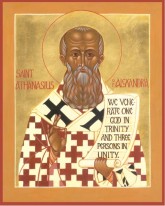 We really don’t know everything. I know – it’s crazy. Christians stand on the shoulders of dedicated, intelligent and devout brothers and sisters from days gone by. Our very vocabulary, the categories and structures of our theology have been shaped by the controversies and issues of bygone days.
We really don’t know everything. I know – it’s crazy. Christians stand on the shoulders of dedicated, intelligent and devout brothers and sisters from days gone by. Our very vocabulary, the categories and structures of our theology have been shaped by the controversies and issues of bygone days.
This is why creeds and confessions are such valuable tools in a Christian’s arsenal. See, for example:
- The 1833 New Hampshire Confession of Faith
- The 1689 London Baptist Confession of Faith
- The Belgic Confession
So, because Christians before us have already puzzled and thought until their puzzlers were sore, I’ve decided to take some time to read about Christology from some 4th century Christians. Last year, I translated the Nicene-Constantinople Creed (381 AD). I plan to write a short introduction and commentary on it, and basically use it as a vehicle to teach 4th century Christology.
In order to really understand what was going on in the 4th century, I need to do two things:
- I need to read some good history books, and
- I need to read what Christians from the 4th century actually wrote about Christ, and see how they responded to the Arian heresies and the controversy about the Holy Spirit.
That’s where Athanasius of Alexandria comes in. He was a key figure in the Christological controversies of the 4th century; perhaps the key player. I don’t have time to read everything he wrote (that would take a while!), but I am taking time to read some of it.
That brings me to the point. The man was a genius. It’s always humbling to learn something from really smart, dead guys. And, to top it off, Athanasius didn’t even have wireless internet!
In this short excerpt from his work On the Incarnation of the Word, Athanasius tackled the objection that Jesus’ death was humiliating and unfitting for the Son of God. Read what he has to say, and think about it:
For perhaps a man might say even as follows: If it was necessary for His death to take place before all, and with witnesses, that the story of His Resurrection also might be believed, it would have been better at any rate for Him to have devised for Himself a glorious death, if only to escape the ignominy of the Cross.
But had He done even this, He would give ground for suspicion against Himself, that He was not powerful against every death, but only against the death devised for Him; and so again there would have been a pretext for disbelief about the Resurrection all the same. So death came to His body, not from Himself, but from hostile counsels, in order that whatever death they offered to the Saviour, this He might utterly do away.
And just as a noble wrestler, great in skill and courage, does not pick out his antagonists for himself, lest he should raise a suspicion of his being afraid of some of them, but puts it in the choice of the onlookers, and especially so if they happen to be his enemies, so that against whomsoever they match him, him he may throw, and be believed superior to them all; so also the Life of all, our Lord and Saviour, even Christ, did not devise a death for His own body, so as not to appear to be fearing some other death; but He accepted on the Cross, and endured, a death inflicted by others, and above all by His enemies, which they thought dreadful and ignominious and not to be faced; so that this also being destroyed, both He Himself might be believed to be the Life, and the power of death be brought utterly to nought.
So something surprising and startling has happened; for the death, which they thought to inflict as a disgrace, was actually a monument of victory against death itself. Whence neither did He suffer the death of John, his head being severed, nor, as Esaias, was He sawn in sunder; in order that even in death He might still keep His body undivided and in perfect soundness, and no pretext be afforded to those that would divide the Church.[1]
You’d be surprised how much you read in Christian books is really just a regurgitation of stuff somebody else said a long time ago. I’m learning a lot from Athanasius. I can also see where our understanding of theology has, in some instances, advanced beyond him – particularly in the 5th century, leading up to the Chalcedonian Creed. But, what an explanation he provided here!
You can learn a lot from smart, dead guys . . .
Notes:
[1] Athanasius of Alexandria, “On the Incarnation of the Word,” in NPNF2, ed. Philip Schaff and Henry Wace, trans. Archibald T. Robertson (New York, NY: Christian Literature Company, 1892), 4:49.
